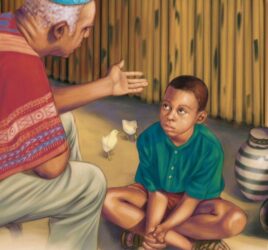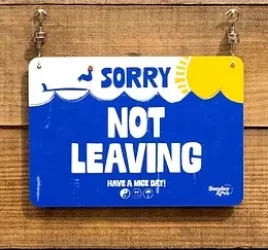
Learning to say goodbye
This May, I went through an event that I had been both expecting and fearing for some time, the passing of my dad. He would have been 100 years old this October.
I dreaded his passing for years, not only because he was my dad, but also because all throughout my childhood, I tried to connect with a man who was not emotionally available.
I always knew that my dad loved me. He provided for his family. He was always there for us, he was a rock that we could count on at all times. A hard working man, a family man, but not a communicating dad.
Raised by a single mom, my dad had never learned how to display his emotions. He grew-up stuffing his feelings deep inside, as it was expected of him. Then came the Second World War. As a young man, he joined the French resistance and the French Army, participating in the liberation of Europe. He came back from the war even more emotionally closed off. He had lost all of his friends at war, and had a tough time reintegrating the “normal civilian life”.
Getting married and building a family didn’t change that reality. He suffered from a “survivor’s guilt” syndrome his entire life, and was embarrassed with any display of emotions, good or bad.
Why I am telling you this?
Because when we live in an international setting, we are not really different.
As international workers we too, suffer from repeated losses, it’s just the reality of our lives.
Which ones? First, the family and friends we left back home. Then the new friends we made who suddenly have to move to a different country. Or if we ourselves have to say goodbye, filled with guilt, because we are the ones moving away because we accepted a new position, somewhere else on the planet. Friends, colleagues, church members… the list is endless and it’s the same for our children.
Multiple losses, multiple repeated grieving processes forced on us because of our obedience to God…
As a consequence along the years, we develop an almost spontaneous resistance to sharing emotions too deeply with those we live life with, especially when they belong to the category of those we will potentially have to say goodbye, “one of these days”.
So, most of the time, unknowingly, we begin to protect ourselves with emotional walls that we develop around our heart and soul, in order to not hurt too much when we will inevitably have to say goodbye. Those walls are supposed to protect us from emotional pain and you know what? They do succeed to a certain point.
The problem is that because they seem effective, we tend to unknowingly, expend them also toward those who belong to our inner circle. These walls end up not only protecting us from painful emotions, but also keeping us from feeling deeply connected with those we love the most. They don’t have full access to our heart anymore!
What can we do when we see these walls in us? Has someone you love or value already told you about your emotional distance?
Back to my dad: Because I knew that he wasn’t able to give me what I needed from him. I intentionally decided years ago, to go get these emotions from him.
I spent hours purposely talking to him about emotional topics, like his childhood, his years as a soldier, his dreams, his doubts, his faith…
He didn’t know how to say “I love you”, but after telling him numerous times that I loved him, in addition to a special training session he received from my wife Rachel, he was able to tell me those “magic words”several times before he past away!
He wasn’t a hugger, but I hugged him multiple times whenever I was with him. Then he was the one who wanted to hold my hand.
I spent hours talking to him, leading the conversation towards what I needed from him, and by doing so, also giving him the opportunity to process and share his own emotions with me.
Be intentional, this is key.
Chose to prepare yourself, whenever it’s possible, by intentionally spending time with those who matter to you. Don’t push it off to another day.
Let them know how important they are, how much you appreciate them, what they mean to you. Use words, don’t just think about how much you love them, tell them!
Tell them what you want them to know about you, don’t let them guess.
Go to them, create opportunities instead of forever regretting not doing it.
Open up, take risks, you’ll see it will be worth it.
When my dad passed away, I felt the great loss of not being able to have access to him anymore. But to my surprise, the grieving process wasn’t as painful as I was expecting it to be. Somehow I felt like, by being intentionally sure that I would have no regret about my relationship with him, I had already prepared myself. It was still difficult, but I was at peace.
Living in an international setting puts us in a place of regular and inevitable grief of relationship. Let’s not be victims of those repetitive emotional shocks. Let’s not allow them to become a trauma that defines us. It’s easy to wall-up inside an unreachable emotional fortress, unavailable to our family and even ourselves, but it’s painful to everyone.
It’s going to require courage, and determination from you, to leave these walls behind and allow yourself to hurt again. But it’s emotionally healthy. You need it for your own personal growth and stability. Those living around you, need you to be emotionally available to them. Do not deprive them of a display of your affection. You need it as much as they do.
Ask yourself these questions: “Lord, am I 100% emotionally available to my spouse, my family, my friends, those around me who matter the most? Am I going to regret not doing-not saying something to someone who matters to me, a member of my congregation?
What is stopping me from being emotionally available?
What can I do to change my behaviour?
In this matter, as in every other, Jesus remains our best example, the one whose steps we can confidently follow:
When Jesus saw her weeping and the Jews who had come with her weeping, he became perturbed and deeply troubled, and said, “Where have you laid him?” They said to him, “Sir, come and see.” And Jesus wept. So the Jews said, “See how he loved him.” (John 11:33-36 NABRE)



